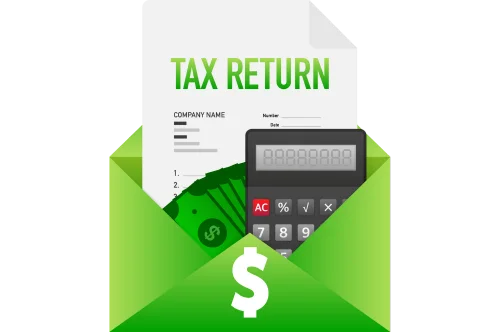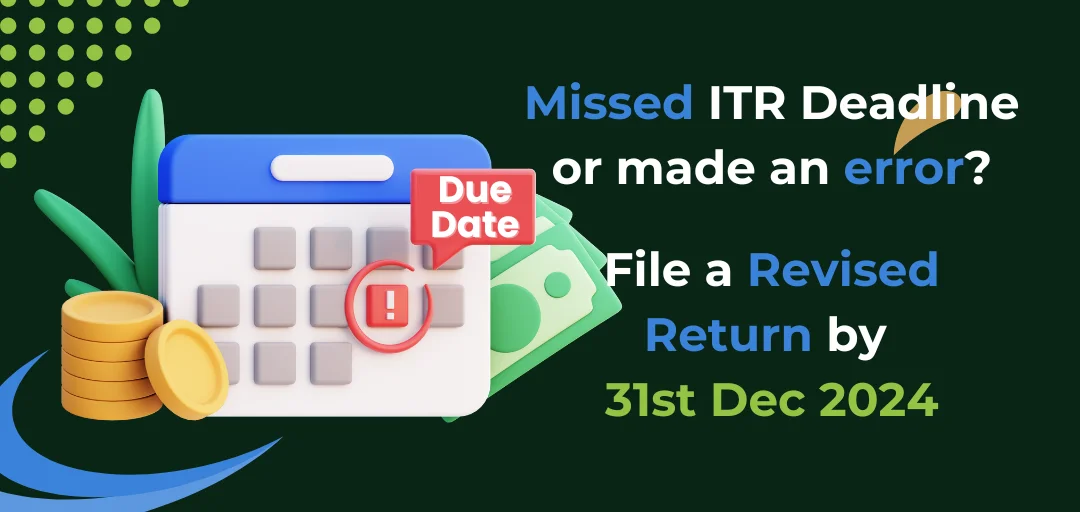Missed ITR Deadline or Made an Error? File a Revised Return by 31st December 2024
As the financial year wraps up, it’s critical for taxpayers to ensure that their Income Tax Return (ITR) filings are accurate and compliant with Indian tax laws. If you missed the original deadline for filing your ITR or discovered errors in the submitted return, don’t panic. The Income Tax Act provides an opportunity to rectify your mistakes or file late returns through a revised return—but there’s a catch: the deadline for filing a revised return for the financial year 2023-24 is 31st December 2024.
This blog explains everything you need to know about filing a revised return, including eligibility, steps, and tips for seamless compliance.
What Is a Revised Return?
This allows taxpayers to correct errors or omissions in their originally filed ITR. Under Section 139(5) of the Income Tax Act, taxpayers who filed their ITR within the stipulated deadline can revise their return if they discover mistakes like:
- Incorrect income details
- Misreporting of deductions or exemptions
- Calculation errors
- Missing income sources
For late filers, it’s also a chance to comply with tax regulations and avoid penalties.
Who Can File a Revised Return?
Any individual, HUF (Hindu Undivided Family), or business entity that has filed their ITR, even after the initial deadline, can file a revised return if required. The process applies equally to those who have filed a belated return under Section 139(4).
Key Deadlines
The deadline for filing a this for the financial year 2023-24 is 31st December 2024. Missing this deadline could result in:
- Loss of refunds: If you’re eligible for a refund, failing to file your revised return will forfeit your claim.
- Penalties: Under Section 234F, late filing penalties can reach up to ₹10,000 for delayed compliance.
Common Scenarios for Filing a Revised Return
Here are some scenarios where filing a revised return becomes essential:
- Omitted Income: Forgetting to include income sources like interest earned on savings or fixed deposits.
- Incorrect Deductions: Misreporting deductions under Section 80C, 80D, or others.
- Errors in Personal Details: Mistakes in PAN, bank account information, or address.
- Mismatch in Form 26AS: Differences between TDS credits and reported income.
Steps to File a Revised Return
Filing a revised return is straightforward and can be done online through the Income Tax e-filing portal. Here’s how:
- Login to the e-Filing Portal: Visit www.incometax.gov.in and log in using your PAN and password.
- Select ‘File Revised Return’: Navigate to the ‘File Returns’ section and select the option for a revised return under Section 139(5).
- Provide Original Return Details: Enter the acknowledgment number and date of filing of your original return.
- Make Necessary Changes: Correct the errors or omissions in your original ITR.
- Verify Your Return: Submit your revised ITR and verify it via Aadhaar OTP, EVC (Electronic Verification Code), or by sending a signed physical copy to the CPC in Bengaluru.
Benefits of Filing a Revised Return
- Avoid Penalties: Timely correction of errors ensures compliance with tax laws.
- Claim Missed Deductions: Recover tax benefits you might have overlooked initially.
- Reduce Audit Risks: Ensuring accuracy minimizes the chances of scrutiny from tax authorities.
- Access Refunds: Rectifying errors can unlock refunds that might otherwise be delayed or denied.
Tips for Filing a Revised Return
- Check Form 26AS and AIS: Always reconcile your income and TDS details before filing.
- Review Supporting Documents: Verify salary slips, bank statements, and investment proofs.
- Use Accurate Software: Opt for reliable tax-filing software or tools to ensure precision.
- Double-Check Deductions: Reassess all claimed deductions and exemptions.
- Seek Professional Guidance: If the errors are complex, consult a tax expert to avoid further mistakes.
Penalties for Non-Compliance
Failure to file your revised return by the 31st December 2024 deadline could lead to:
- Prosecution in extreme cases of tax evasion.
- Late filing fees of up to ₹10,000 under Section 234F.
- Interest under Sections 234A, 234B, and 234C for unpaid tax liabilities.
Why You Should Act Now
Filing a revised return is your last chance to rectify errors or omissions in your tax filing for FY 2023-24. With only a few weeks left before the deadline, taxpayers must prioritize compliance to avoid penalties or forfeiting refunds.
Don’t wait until the last moment—file your revised return today!
Conclusion
The revised return mechanism is a lifeline for taxpayers, providing an opportunity to rectify errors and ensure compliance with Indian tax laws. Whether you missed the ITR deadline or identified mistakes in your original filing, acting promptly can save you from penalties and unlock eligible refunds.
Remember, the deadline for filing a revised return for FY 2023-24 is 31st December 2024. Use this opportunity wisely to close the year on a compliant note.
Our Tax Services

ITR Filing
ITR Filing services provide full assistance with Income Tax Return submissions, ensuring accurate and timely compliance with all tax regulations and statutory requirements for both individuals and businesses.

Tax Audit
A tax audit reviews financial records to ensure compliance with tax laws, verifying income, deductions, and expenses. It minimizes errors and helps businesses avoid penalties, ensuring accurate tax reporting.

E-Commerce Tax Services
Navigating taxes as an e-commerce seller can be challenging due to the unique complexities of online businesses. Here’s a quick overview of the essential tax services that can help simplify compliance and optimize tax savings



